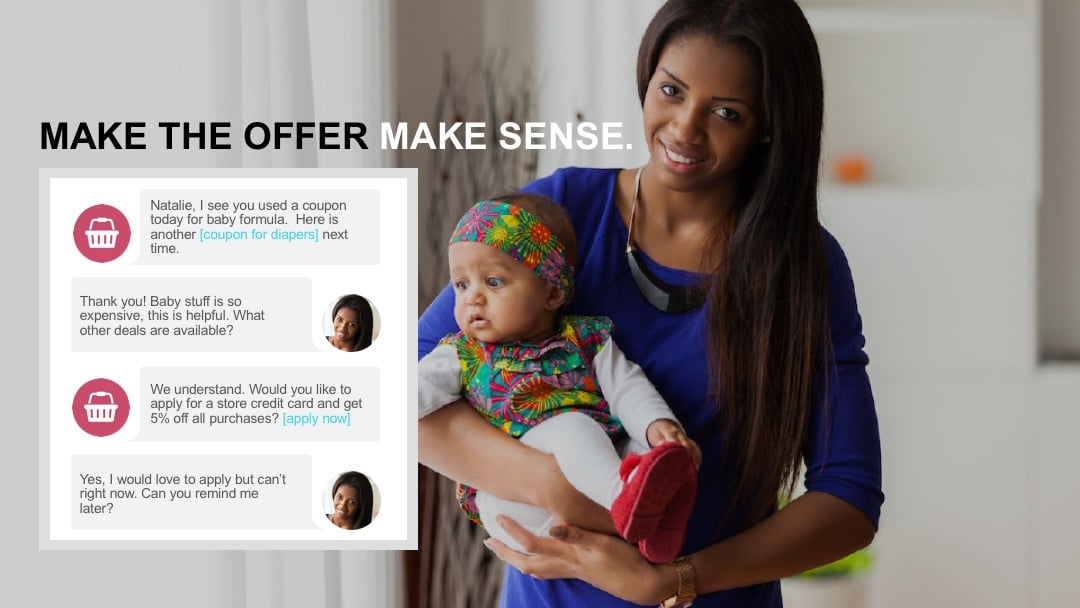3 ways retailers can use chatbots to form a happy marriage with their customers.
The classic American wedding. It’s one of the most reliable engines of consumerism we have in our culture. It ties the knot for virtually every sector of our economy from hospitality, transportation, food, flowers, and photography, to textiles, social media, event planning, and entertainment. Every day there’s a couple that gets married, and it’s a free for all for businesses to grab a piece of the matrimonial market share.
Great experiences with wedding vendors and retailers can create huge word-of-mouth business and even life-long customers if done correctly. But what about when companies miss those opportunities to extend services beyond the big day?
I got married in February of 2015. Like most men who don’t work in formal business sectors, I don’t own many suits and I don’t particularly enjoy the fearful experience of shopping “in the dark.” Just having an attendant ask me my measurements practically throws me into a tornado of confusion. However, on my wedding day I liked the way I looked. The suit fit perfectly. I felt classier than ever, and being at an age (30) where many of my friends and family were planning their own weddings, it was the perfect time for me to start shopping for more formal wear.
There was a problem, though. As an under-educated and under-experienced shopper, I didn’t get the guidance I needed after my wedding to keep me interested. The company I bought from, which we’ll call Men’s Formal Company, left me to continue my customer journey alone. I got bombarded with daily deals and discount after discount after discount. But this is what Men’s Formal Company failed to realize: It wasn’t price that was keeping me out of its stores and off its website, it was the impersonal approach. Instead of throwing attention at the problem, it threw money at me. Not always a smart idea.
It got me wondering. Instead of an incessant email campaign or cold calls from sales people, what if chatbots could lead me back into a 42 regular?
Here are some of the ways retailers can use conversational chatbot technology to continue the customer journey long before the need to spend ends.
- Find out more about me and my lifestyle – Simply put, there’s only so much a man can spend on formal wear. In my instance it needs to be for big events or important job functions. For an investment banker, purchases might come monthly. Emails never asked me any of those questions. Instead I got a discount per day. Not only was it excessive, it wasn’t helpful. A customer service-centric chatbot could ask me if I’ve got weddings, job interviews, conferences, banquets or other major events in my future. It could guide me on what I need for those events, ask me my budget, and even start recommending those great discounted items. We’d already be well on our way to sharper service.
- Teach me about trends and styles – For me, fashion is a function of necessity. I work hard and don’t always have time to read up on the latest styles, trends, and seasonal dress. Chances are I would pick the same suit in the summer as I would in the fall, and for Men’s Formal Company it would benefit to keep me informed. As I converse with a chatbot on a web site or app, it could direct me to custom content on seasonal dress tips, email me a proprietary style guide, link me to new collections, and give me the much needed info I need to dress myself appropriately.
- Get me back in the store at the right time – Since chatbots can now learn about me and educate me, I’ve got more buying power. A chatbot has a much better gauge of my interest level than a catch-all Eblast does. Why do these conversations matter? Well, now that I’ve been taken care of, so to speak, I’m able to walk back into Men’s Formal Company ready to make a purchase with no fear. Instead of a salesperson running through a bunch of uncomfortable questions, they can concentrate on doing what they do best – getting me looking dapper and closing a sale. Chatbots don’t replace human customer service, they enhance it by bringing in your experts when necessary.

Discounts aren’t the only ways to drive customer loyalty. Most customers are like me. They want to spend intelligently, and they want a great digital experience. Hopefully chatbots are the assistants that can help companies everywhere make the customer journey educational and enjoyable instead of leaving us at the altar.
Learn more about how chatbots transform in-store and digital selling and servicing by downloading our Executive Brief: Shopping with Conversational Retail.







